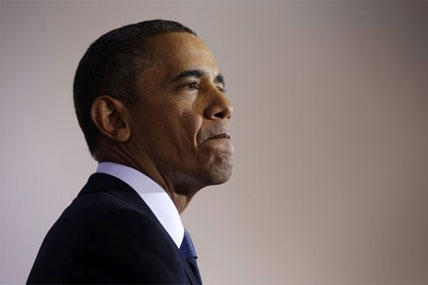President Barack Obama fiercely defended his administration's controversial use of drone strikes against terrorism suspects while reiterating his call to close the prison at Guantanamo Bay.
In a speech designed to provide more transparency into his administration's counterterrorism policies, Obama said unmanned aircraft are best suited to target al-Qaeda suspects and other high-value targets in Afghanistan and other countries.
"Conventional airpower or missiles are far less precise than drones, and likely to cause more civilian casualties and local outrage," he said in remarks at Fort McNair in Washington, D.C. "So it is false to assert that putting boots on the ground is less likely to result in civilian deaths, or to create enemies in the Muslim world. The result would be more U.S. deaths, more Black Hawks down, more confrontations with local populations."
Obama also revived a push to close Guantanamo Bay, where more than half of the 166 detainees in custody are currently on a hunger strike, and asked Congress to pass a so-called shield law to protect reporters from having to reveal confidential sources. His administration has aggressively investigated national-security leaks, including cases involving journalists.
The remarks were part of a White House effort this week to shed more light into U.S. counterterrorism operations by releasing updated standards for the use of force overseas and declassifying information that revealed four Americans have been killed in drone strikes abroad since 2009.
One of those was Anwar Awlaki, a U.S.-born cleric who was killed in a drone attack led by the Central Intelligence Agency in Yemen in 2011 after he was found to have helped coordinate a plot to detonate explosive devices on U.S.-bound cargo planes.
"I do not believe it would be constitutional for the government to target and kill any U.S. citizen – with a drone, or a shotgun – without due process," Obama said. "But when a U.S. citizen goes abroad to wage war against America – and is actively plotting to kill U.S. citizens ... his citizenship should no more serve as a shield than a sniper shooting down on an innocent crowd should be protected from a SWAT team."
The U.S. seeks to minimize civilian casualties and the administration consults with the Justice Department and members of Congress on each mission, Obama said.
Still, the clandestine nature of the operations can shield the government from public scrutiny and the White House is reviewing proposals to extend oversight of the activity, either via a special court or an independent board within the executive branch, Obama said.
During a background briefing with reporters before the address, senior administration officials signaled that the updated counterterrorism policy sets a preference for the U.S. military, not the Central Intelligence Agency, to take the lead on lethal attacks involving unmanned aircraft, including those conducted outside of war zones such as Afghanistan.
Obama, who unsuccessfully sought to close Guantanamo Bay during his first term, said congressional restrictions that prevent him from transferring detainees to other countries "make no sense." Under former President George W. Bush, the U.S. transferred 530 detainees from the facility, he said, and Senator John McCain, R-Ariz., has supported its closure.
"No person has ever escaped from one of our super-max or military prisons in the United States," Obama said. "Our courts have convicted hundreds of people for terrorism-related offenses, including some who are more dangerous than most [Guantanamo] detainees."
Rep. Howard "Buck" McKeon, R-Calif., chairman of the House Armed Services Committee, said he is "open" to the president's proposal, but that any plan must consist of more than "political talking points."
"This speech was only necessary due to a deeply inconsistent counterterrorism policy, one that maintains it is more humane to kill a terrorist with a drone, than detain and interrogate him at Guantanamo Bay," McKeon said in a statement before the speech. "To close GTMO, I need to know what the president intends to do with those terrorist detainees who are too dangerous to release, but cannot be tried."
Defense Secretary Chuck Hagel praised Obama's remarks and said he directed the Pentagon to work with other agencies to implement his guidance, "including the efforts to close the detention facility at Guantanamo Bay."
























